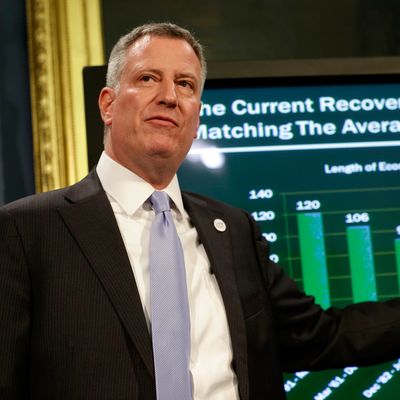
Bill de Blasio put his money where his morals are.
Well, the city’s money, the taxpayers’ money. And the mayor’s morals, at least broadly, are presumably shared by the 752,604 New Yorkers who voted for him in November — and who should not be at all surprised by his consistent priorities: education, housing, the homeless, and raises for municipal workers, all in service of combating income inequality.
Yet de Blasio’s budget is still striking because, by backing his rhetoric with billions, he is taking greater ownership of his stature as the country’s leading elected lefty. There is little of the conventional post-election tacking to the center done by many Democrats — like, say, that quisling Obama.
Caveat paragraph: De Blasio inherited a local economy significantly stronger than the national disaster the president was handed in January 2009. De Blasio needs to get his plans through a relatively weak, highly agreeable legislature; Obama’s relationship with Congress is, um, different. De Blasio is not giving away free lunch (at least not more, or not yet), and he’s prudently preserving $1 billion in one reserve fund and doubling a second to $600 million.
But there will be spending. Lots of it. Of new money — $652 million from higher than projected income taxes — and of old — $2 billion from reserve funds built up over decades that will go to labor deals. Plus borrowed money — $3.2 billion over the next four years. There will also be higher deficits. The mayor said he was “adamant” that debt service stay below “historical limits” — though that comparison incorporates the bad-old early ‘80s, right after the city nearly went bankrupt.
There will be no layoffs or cuts in services. Or even a feint in that direction. “Mayor Bloomberg had city agencies prepare lists of cuts every year,” says Carol Kellerman, president of the Citizens Budget Commission. “It was a good exercise in fiscal discipline, even if the cuts never took effect.”
This time around, de Blasio didn’t demand a list of possible cuts, considering it an empty gesture, though the administration says it’s hunting for future “efficiencies.” The mayor’s camp scoffs that “the great manager” Bloomberg left 152 municipal labor contracts open, and that he spent too generously when times were flush. Perhaps. And they’re right that de Blasio isn’t getting enough credit for the conservative measures in his first budget, especially the prospect of deep reductions in health-care costs.
Yet even as de Blasio took pains to insist he’s a new breed of fiscally responsible progressive, he happily — strenuously — embraced his image as a liberal crusader. Again and again, the mayor hammered home the philosophical righteousness of his spending choices: “Budgets are not just a collection of numbers … they reflect fundamental values.” “This is a fundamentally progressive budget.” “In this budget, you will see clearly what I believe in, what this administration believes in.”
The mayor’s beliefs are inarguably clear, and two days before unveiling his budget, de Blasio got fresh, powerful encouragement that he’s heading in the right political direction, from none other than his old boss, Hillary Clinton. With de Blasio in the audience, the prohibitive favorite to become the next Democratic presidential nominee declared that worsening income inequality is causing “social collapse.”
Even de Blasio hasn’t been quite that apocalyptic. Whether his budget moves the city toward greater fairness, and whether it proves fiscally responsible, can’t be known for years, of course. But yesterday provided a three-sided coincidence that neatly dramatized where city politics are right now. The mayor presented his first, populist budget on his 53rd birthday, and the ascendant Working Families Party — which de Blasio helped found — celebrated its 16th anniversary. There’s no word on whether all the cake slices were the same size. But New York is the center of a crucial progressive experiment to distribute the fun more evenly.





























